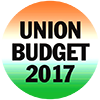 The Budget is the most extensive account of Government finances in which revenues from all sources and expenses of all activities undertaken are aggregated.
The Budget is the most extensive account of Government finances in which revenues from all sources and expenses of all activities undertaken are aggregated.
It comprises the revenue budget and the capital budget.
It also contains estimates for the next fiscal year called budgeted estimates.
The ministry of finance, administrative ministries and the comptroller and auditor general are the main players in the formation of the Union Budget.
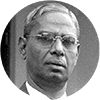 India's first Finance Minister R K Shanmukham Chetty presented the first Budget at 5 pm on November 26, 1947.
India's first Finance Minister R K Shanmukham Chetty presented the first Budget at 5 pm on November 26, 1947.
The word Interim Budget was introduced for the first time by R K Shanmukham Chetty in his budget speech for 1948-1949.
From then onwards, an interim budget began to mean a budget for a short period of time.
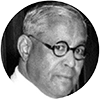 The first Budget of the Republic of India was presented by John Mathai on February 28, 1950.
The first Budget of the Republic of India was presented by John Mathai on February 28, 1950.
 Chintaman Dwarakanath Deshmukh -- the first Indian Reserve Bank of India governor -- presented the interim Budget for 1951-1952.
Chintaman Dwarakanath Deshmukh -- the first Indian Reserve Bank of India governor -- presented the interim Budget for 1951-1952.
Budget papers began to be prepared also in Hindi from 1955-1956.
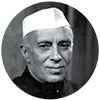 Jawaharlal Nehru was the first prime minister to present the Budget when he was in charge of the finance ministry in 1958-1959.
Jawaharlal Nehru was the first prime minister to present the Budget when he was in charge of the finance ministry in 1958-1959.
The highly confidential Budget papers are printed at the finance ministry's own printing press.
The press at the basement of the building becomes a forbidden area and about 30 employees of the press stay in the ministry for the last seven days to ensure foolproof secrecy.
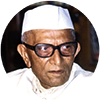 Morarji Desai was the only finance minister to present two Budgets on his birthday -- February 29 -- in 1964 and 1968.
Morarji Desai was the only finance minister to present two Budgets on his birthday -- February 29 -- in 1964 and 1968.
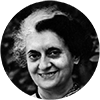 Indira Gandhi was the only lady finance minister.
Indira Gandhi was the only lady finance minister.
The then prime minister took over the finance portfolio from 1970 to 1971.
Jawaharlal Nehru, Indira Gandhi and Rajiv Gandhi presented Budgets while serving as prime ministers of India.
The Budget for 1973-1974 is known as the 'Black Budget'. That year's budgetary deficit was Rs 550 crore.
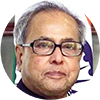 Pranab Mukherjee was rated as the best finance minister in the world in 1984 by Euromoney magazine.
Pranab Mukherjee was rated as the best finance minister in the world in 1984 by Euromoney magazine.
Pranab Mukherjee's 1982 Budget speech lasted 95 minutes. This prompted then prime minister Indira Gandhi to say, 'The shortest finance minister has delivered the longest Budget speech.'
Corporate tax -- currently known as the Minimum Alternate Tax -- was first introduced by Rajiv Gandhi in the 1987 Budget.
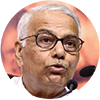 For the first time, two ministers from two different parties presented the interim and final Budgets in 1991-1992.
For the first time, two ministers from two different parties presented the interim and final Budgets in 1991-1992.
Yashwant Sinha presented the interim Budget while Dr Manmohan Singh presented the final Budget.
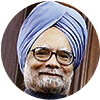 Dr Manmohan Singh opened up the Indian economy, encouraged foreign investment, reduced peak import duty from 300 plus percent to 50 percent and introduced the concept of service tax in 1994.
Dr Manmohan Singh opened up the Indian economy, encouraged foreign investment, reduced peak import duty from 300 plus percent to 50 percent and introduced the concept of service tax in 1994.
Two finance ministers, Yashwant Sinha and Dr Manmohan Singh, have presented 5 Budgets in a row.
Until 2000, the Budget was presented at 5 pm on the last working day of the month of February.
This practice was inherited from the British, when its parliament would pass its budget in the noon, followed by India in the evening that day.
Yashwant Sinha changed the timing to 11 am.
Yashwant Sinha has the distinction for the maximum rollbacks in the Budget that he presented in 2002.
He went back on at least five Budget proposals.
His 1991 interim Budget was presented against the backdrop of India's foreign exchange crisis.
His 1999 Budget was presented against the backdrop of the 1998 nuclear tests after America imposed economic sanctions against India.
The 2000 Budget was presented against the backdrop of the 1999 Kargil War while the 2001 Budget was presented against the backdrop of the devastating Gujarat earthquake.
 Schemes like the National Rural Health Mission, the Gender Budget and NREGA were introduced in the 2005-2006 Budget.
Schemes like the National Rural Health Mission, the Gender Budget and NREGA were introduced in the 2005-2006 Budget.